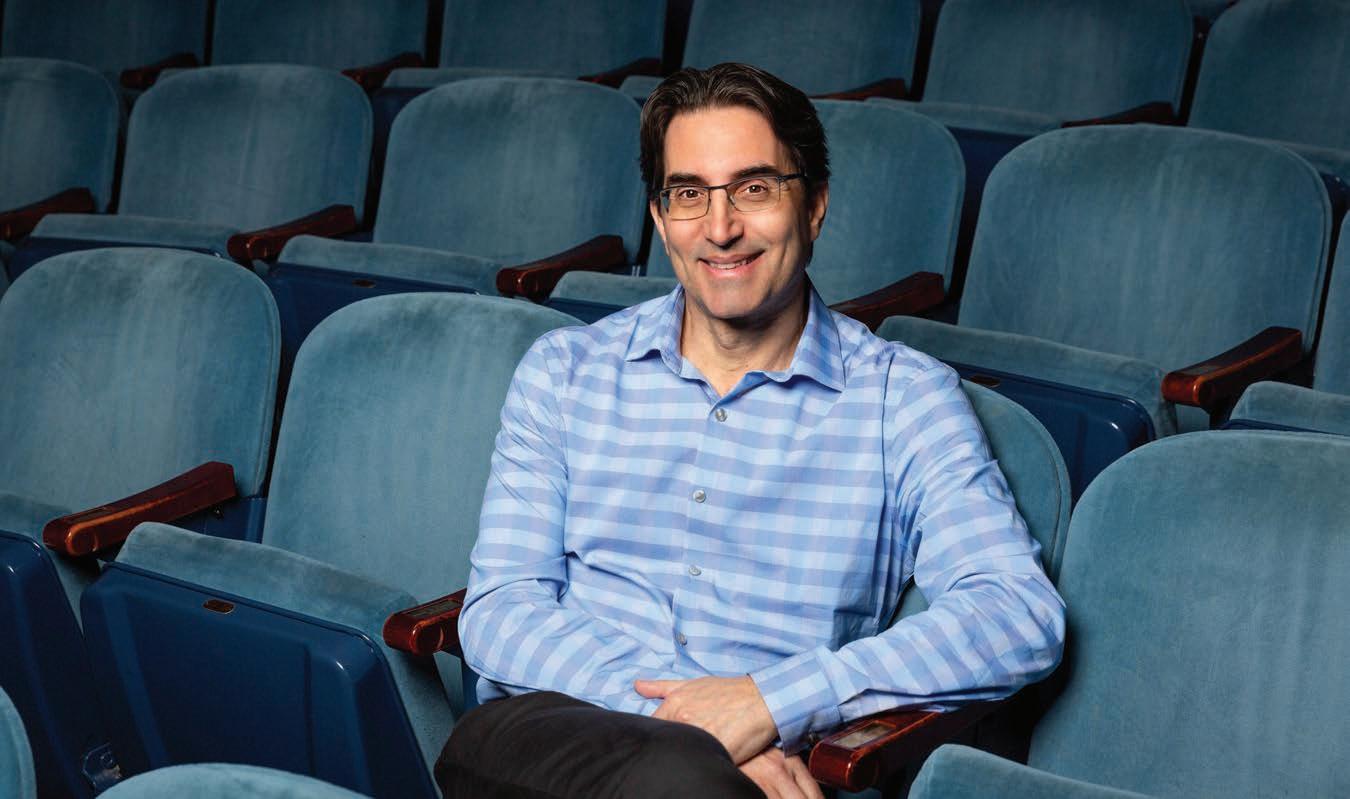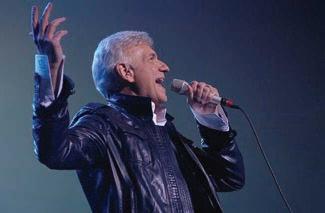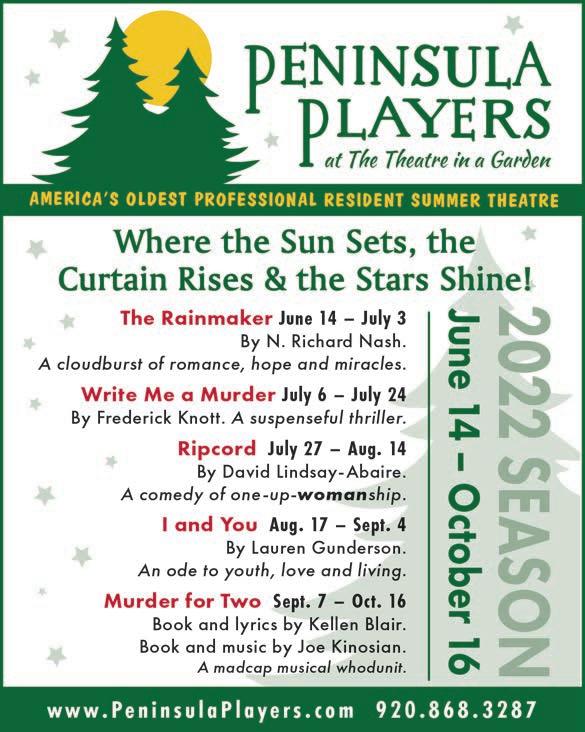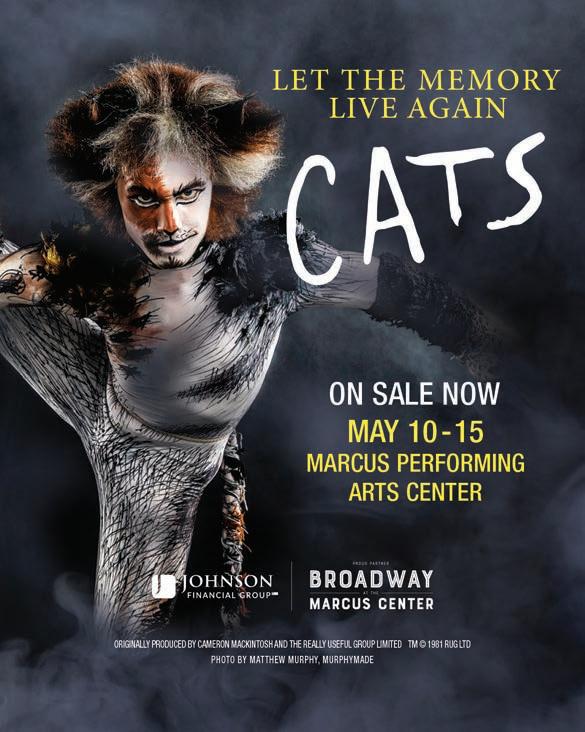
3 minute read
Quasimodo Sings as Skylight Performs Victor Hugo’s ‘Hunchback of Notre Dame’
MICHAEL UNGER
Photo and illustration courtesy of Skylight Music Theatre.
BY DAVID LUHRSSEN
For classic film devotees, The Hunchback of Notre Dame means Charles Laughton, under disfiguring makeup, swooping down from the belltower to rescue his beloved Esmeralda from the gallows. Disney fans will remember Quasimodo, voiced by Tom Hulce, performing a similar feat in full color. This month, Skylight Music Theatre will put a different spin on the story with its production of Dennis DeYoung’s musical, The Hunchback of Notre Dame.
Yes, that Dennis DeYoung, singer-songwriter for the platinum-selling ‘70s band Styx. The Chicago-based Styx was on the radio-friendly side of progressive rock with hits such as “Lady” and “Come Sail Away.” And like his contemporaries Rick Wakeman and Alan Parsons, DeYoung harbored ambitions to turn classic literature into classic rock. Skylight’s Artistic Director Michael Unger grew up in Chicago as a Styx fan and became friends with DeYoung. He was among the first to hear the score for Hunchback in its early form, 28 years ago. “It was love at first hear,” Unger says. “As I was just starting on my directing career, I knew I would never get the opportunity to direct it myself.” Time has proven him wrong.

DeYoung’s Hunchback debuted in 2008 at Chicago’s Bailiwick Repertory Theatre and will be presented by Skylight in a newly revised version. “Dennis and I have been working together on this revision for the past year or so,” Unger says. “We
DENNIS DEYOUNG


have moved a few songs around, we have adjusted many scenes, and worked very hard to update the script according to some of the sensibilities and sensitivities that have rightfully come to the fore since it was written.”
DeYoung wasn’t updating the Hollywood versions but went directly to Victor Hugo’s 1831 novel. Set in late medieval Paris, the protagonist is the deaf hunchback Quasimodo, an outcast struggling against the cruelty and hypocrisy of his society. He forms a bond with another outcast, a beautiful Romani (gypsy) woman, Esmeralda. The story’s villain, Frollo, is initially sympathetic. The Roman Catholic cleric is Quasimodo’s guardian but his thwarted lust for Esmeralda leads to her arrest after he falsely charges her with witchcraft.
“While it does not end happily for our lead characters, there is a hopeful quality in the power of their love set against a gorgeous DeYoung melody,” Unger says. “Dennis has wisely excised some characters, invented a couple of others, conflated a few and comes up with a wonderfully streamlined version that feels perfectly Hugo-ian.”
MEMORABLE MELODIES
When performed well, The Hunchback is emotionally riveting melodrama, perhaps ideal for DeYoung’s power balladry which, according to Unger, will sound “1,000 percent familiar” to Styx fans. “It is interesting because it feels very much in what could be a 15th century Hugo world, while at the same time feels very contemporary,” Unger continues. “I promise you if you come to the show, you will go out humming many of the songs.”
The Hunchback of Notre Dame, along with Hugo’s Les Misérables and a handful of stories by Charles Dickens, are among the only 19th century novels that have been continuously reimagined in new media and represented to new audiences over the past century. Some two dozen screen adaptations of Hunchback have been made since the dawn of motion pictures. “The fascinating characters who populate these stories elicit strong reactions, from sympathy to revulsion, and many emotions in between,” Unger explains. “The love interests tug at the heartstrings while the villains warn us of what can happen when the internal and external checks and balances fail. “But what I truly love about Dennis’ portrayal of the fallen priest, Claude Frollo, is that Dennis sheds some light on why Frollo is the way he is. He is not simply the personification of evil. His internal conflict and turmoil have a basis in some universal truths of which he loses all control. The best Scrooges in the best adaptations of A Christmas Carol have our sympathy because we understand the miser’s pathological fear of poverty. Scrooge has his epiphany. Frollo doesn’t. Dennis’ Frollo is destined for the end he receives, but somewhere, long ago buried deep down inside, there was once hope for him.”
Skylight Music Theatre’s The Hunchback of Notre Dame will be performed May 20June 12 at the Broadway Theatre Center, 158 N. Broadway. For more information, visit skylightmusictheatre.org.
David Luhrssen is the author of several books on film and cultural history and is managing editor of the Shepherd Express.










